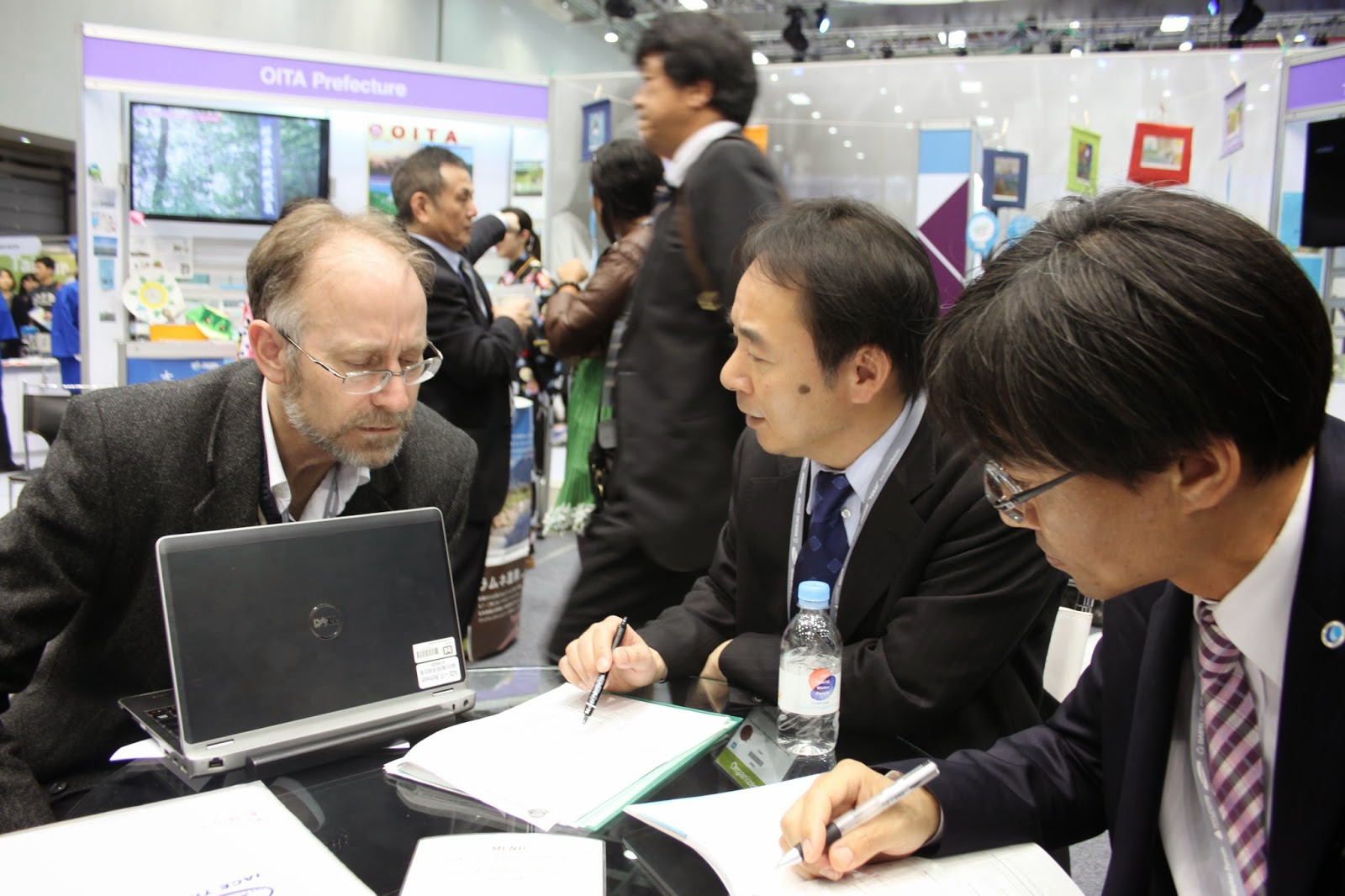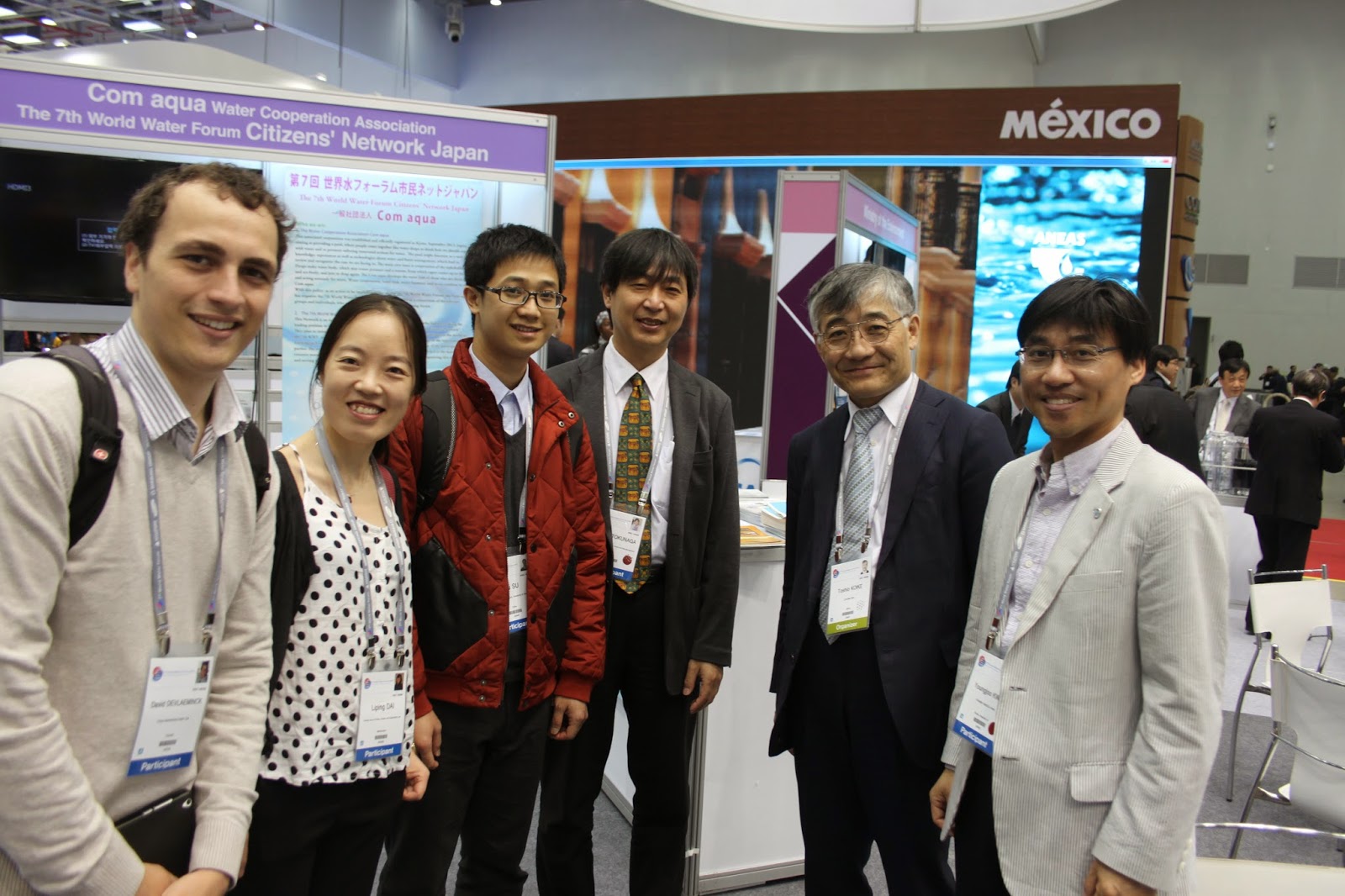7th World Water Forum in Daegu and Gyeongju, Korea - day 5
We spent most of the morning meeting coordinating our concluding session on the last day of the forum. We still had to finalize the schedule, create handouts for the audience, and place as much materials online as possible. Luckily there was a little time left over to catch up with people from the Xiamen international water law department from China, before attending two sessions and being whisked away to a dinner with the typhoon committee.
S.3.Con Water and natural disasters
This session was organized by the Korea Society of Hazard Mitigation (KOSHAM) and the Korea Environment Institute (KEI), and attended by approximately 20 people.
Agenda:
Young-Il Song (KEI)
S3.1: Jaena Ryu (KEI)
S3.2: Seyed Ali Chavosian (RCUWM)
S3.3: Won Kim (KICT)
S3.4: Jungho Im (KAGIS)
S3.5: Hung Soo Kim (KOSHAM)
Panel discussion: Yasuto Tachikawa (Kyoto Univ.), Yanping Qu (IWHR), Kun-Yeun Han (KWRA), Michael Butt (DHI)
Yoshiyuku Imamura (ICHARM)
Hung Soo Kim (KOSHAM)
Objective: As the devastating impact of recent natural disasters such as the flood occurred in Thailand in 2011, indicates, mankind is vulnerable to extreme weather events in developing and even in developed countries. Clearly, such extreme events have always been part of our life and may be caused by climate change. The global climate change is a phenomenon already underway and affects exceedingly unusual natural patterns of weather events and water cycle. This makes water related problems, especially, such as floods and droughts, more difficult to analyze and predict. Climate change is predicted to have a range of serious consequences, some of which will have impact over the longer term, like droughts, while some have immediate and obvious impacts, such as intense rain and flooding. Floods and droughts are major natural disasters involving loss of life and the destruction of property. So, we may need advanced technologies and measures in order to cope with natural disasters.
Session excerpts:
ICHARM’s former member, now working at RCUWM, Dr. Seyed Ali Chavosian (RCUWM), summarized the highlights from his session titled “Advances in Drought Analysis Tools and Coping Strategies”. One of the presenters in that thematic session was Professor Koike, and Dr. Ali explained the water cycle integrator that was introduced.
Further in this concluding session, Prof. Imamura, now working at Yamaguchi university (located between Hiroshima and Kyushu), talked about the future steps of implementation. He focused on the topic of water and disasters, and introduced the 6th WWF priorities, the Sendai Framework for Action, and the Post 2015 development goals related to water hazards. He then showed the objectives and outputs from each of the five sessions of this science and technology topic. Finally he also explained about the thematic session 1.3 and its Implementation Roadmap, and how it was linked to this science and technology theme.
As many audience members took pictures of the slides presented by Prof. Imamura, this can be seen as a contribution of great interest to this concluding science and technology session.
T.4.3.Con Cooperation for reducing conflict and improving transboundary water management
This session was organized by the International Network of Basin Organizations (INBO), and attended by approximately 60 people.
Agenda:
Welcoming speech and introduction to the theme 4.3 (10 min): Mr. Lupercio ZIROLDO Antonio, World president of INBO, Governor of the World Water Council,
Recommendations from contributors of the regional process: Africa, Arab, Europe regions (8 min): Mr. Arnould LEFEBURE, International Scheldt Commission,
Participant Mapping by Mrs. Gillian Martin MEHERS, Facilitator at Bright Green Learning (1 min):
who’s in the room? Stand up when called: Sectors (Government, Business, NGO, Academic, Other?), Design Group Members, others to recognize? Stand up if you attended session: 4.3.3, 4.3.4, 4.3.6
Panel of session coordinators on “Cooperation for improving Transboundary Water management”: sessions 4.3.3., 4.3.4., 4.3.6. (15 min):
- Mrs. Alice Aureli, UNESCO,
- Mr. Paul Haener, International Office for Water,
- Mr. Alain Bernard, International Network of Basin Organizations (INBO
1st roundtable on Cooperation for improving Transboundary Water management (30 min):
- Ms. Liana Ardiles Lopez. General Director of Water, Ministry of Agriculture, Food and the Environment,
- Mr. Yao ATIKPO, Deputy Executive Director, Volta Basin Authority.
- Mr. Christopher BRIGGS, Secretary General, Ramsar,
- Mr. Jean-Michel COMPERE, Water compagnie of the greater Liege area - CILE (Belgium),
- Mr. Jean SCHEPMAN, Artois-Picardie Water Agency Basin Committee.
Participant Mapping by Mrs. Gillian Martin MEHERS, Facilitator at Bright Green Learning (1 min):
who’s in the room? Stand up when called: Sectors (Government, Business, NGO, Academic, Other?), Design Group Members, others to recognize? Stand up if you attended session: 4.3.3, 4.3.4, 4.3.6
Panel of session coordinators on Cooperation for Reducing Conflict: sessions 4.3.1., 4.3.2., 4.3.5. (15 min):
- Mrs. Marian Patrick, Stockholm International Water Institute,
- Mrs. Chantal Demilecamps, UNECE Water Convention,
- Mr. Christian SEVERIN , Global Environment Facility (GEF)
2nd roundtable on Cooperation for Reducing Conflict (30 min):
- Mr. Arnold KREILHUBER, UNEP,
- Mr. Cumali KINACI, Director General of Water Management, Ministry of Forestry and Water Affairs (Turkey),
- Mr. Hosam EL-DIN MUGHAZY, Minister of Water Resources and Irrigation, Egypt.
Questions and answers moderatedby Mrs. Gillian Martin MEHERS, Facilitator at Bright Green Learning (1 min):
Synthesis and conclusion (10 min):
- Mr. Jean-Francois DONZIER, DG4.3 Coordinator, International Network of Basin Organizations (INBO),
- Mr. Nicholas BONVOISIN , UNECE.
Objective: Throughout human history, rivers, lakes and aquifers have served as important sources for human life and activities. Water is a resource without borders. Worldwide, there are 276 transboundary river basins and so far 608 transboundary aquifers identified by IGRAC center and the ISARM program. Climate change coupled with demographic and socio-economic trends are putting water resources under increasing stress. More than before, coordination among riparian countries is essential to strengthen a sustainable management and protection of transboundary water resources.
The final session of theme 4.3 aims at giving an overview of how we can get there. Key messages emerged from the 4.3 thematic sessions will be discussed and pave the way towards implementing cooperative mechanisms for a sustainable transboundary water management. How can water diplomacy be best conducted? How can existing international and regional legal instruments and data exchanges frameworks between riparian countries support that effort? How can we create and strengthen transboundary basin organisations and make sure they get sustainable funding? How can an inter-sectoral approach enhance a sound and efficient transboundary management of water resources?
Session excerpts:
- We should think beyond the river, so that cooperation will be wider than river topics.
- Aquifers can be depleted, upstream or downstream policy doesn't always apply.
- Nothing was done for data exchange between the Netherlands and Belgium after the 1953 disaster.
- In France, it is not allowed by law to invite the bordering city people to town meetings to discuss e.g. public planning issues.
- Environmental assessment and human rights have many links with river/water management.
































No comments:
Post a Comment